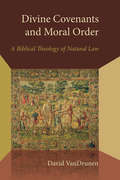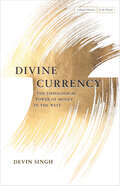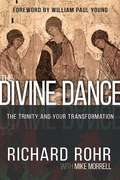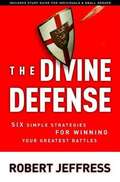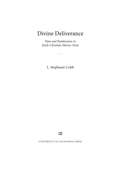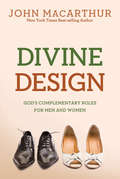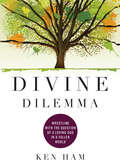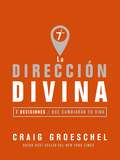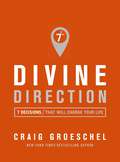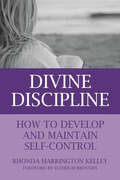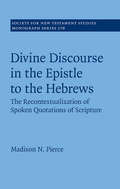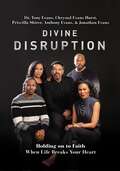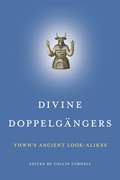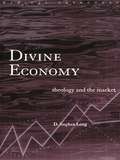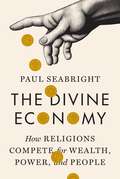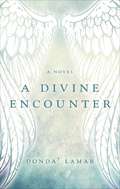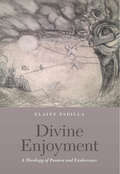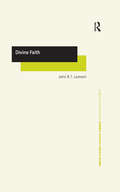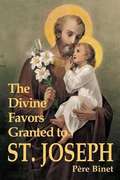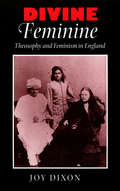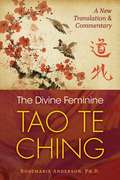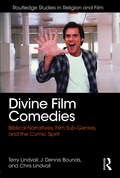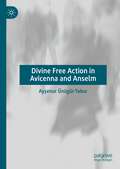- Table View
- List View
Divine Covenants and Moral Order: A Biblical Theology of Natural Law (Emory University Studies in Law and Religion)
by David VanDrunenThis book addresses the old question of natural law in its contemporary context. David VanDrunen draws on both his Reformed theological heritage and the broader Christian natural law tradition to develop a constructive theology of natural law through a thorough study of Scripture.The biblical covenants organize VanDrunen's study. Part 1 addresses the covenant of creation and the covenant with Noah, exploring how these covenants provide a foundation for understanding God's governance of the whole world under the natural law. Part 2 treats the redemptive covenants that God established with Abraham, Israel, and the New Testament church and explores the obligations of God's people to natural law within these covenant relationships.In the concluding chapter of Divine Covenants and Moral Order VanDrunen reflects on the need for a solid theology of natural law and the importance of natural law for the Christian's life in the public square.]>
Divine Currency: The Theological Power of Money in the West (Cultural Memory in the Present)
by Devin SinghThis book shows how early economic ideas structured Christian thought and society, giving crucial insight into why money holds such power in the West. Examining the religious and theological sources of money's power, it shows how early Christian thinkers borrowed ancient notions of money and economic exchange from the Roman Empire as a basis for their new theological arguments. Monetary metaphors and images, including the minting of coins and debt slavery, provided frameworks for theologians to explain what happens in salvation. God became an economic administrator, for instance, and Christ functioned as a currency to purchase humanity's freedom. Such ideas, in turn, provided models for pastors and Christian emperors as they oversaw both resources and people, which led to new economic conceptions of state administration of populations and conferred a godly aura on the use of money. Divine Currency argues that this longstanding association of money with divine activity has contributed over the centuries to money's ever increasing significance, justifying various forms of politics that manage citizens along the way. Devin Singh's account sheds unexpected light on why we live in a world where nothing seems immune from the price mechanism.
The Divine Dance: The Trinity and Your Transformation
by Richard Rohr Mike MorrellIn the pages of this book, internationally recognized teacher Richard Rohr circles around this most paradoxical idea as he explores the nature of God—circling around being an apt metaphor for this mystery we're trying to apprehend. Early Christians who came to be known as the "Desert Mothers and Fathers" applied the Greek verb perichoresis to the mystery of the Trinity. The best translation of this odd–sounding word is dancing. Our word choreography comes from the same root. Although these early Christians gave us some highly conceptualized thinking on the life of the Trinity, the best they could say, again and again, was, Whatever is going on in God is a flow—it's like a dance. But God is not a dancer—He is the dance itself. That idea might sound novel, but it is about as traditional as you can get. God is the dance itself, and He invites you to be a part of that dance. Are you ready to join in?
The Divine Defense: Six Simple Strategies for Winning your Greatest Battles
by Robert JeffressIt’s what youcan’tsee that can hurt you The temptation that regularly assaults you, the depression or illness that pulls you down, the discord in your relationships, the private doubts you harbor about God… These are not just a natural part of life–they’re battles in a behind-the-scenes war against your faith, family, and future. From a balanced perspective, Robert Jeffress lifts the curtain of everyday existence to reveal these invisible but very real battles in the war Satan wages against followers of Christ like you. Because you don’t have to be spiritual road kill… Using the spiritual armor of Ephesians 6,The Divine Defenseoutlines six practical strategies you can use through every day to defeat Satan’s vicious and destructive plan: ·Recognize and replace destructive thoughts (the belt of truth) ·Do what you know you should do (the breastplate of righteousness) ·Make God’s business your business (boots of the gospel of peace) ·Move forward in spite of doubts (the shield of faith) ·Remember your power to win (the helmet of salvation) ·Strengthen your resolve to resist (the sword of the spirit) Together, these strategies formThe Divine Defensethat will help you live victoriously in the unshakable power of God.
Divine Deliverance: Pain and Painlessness in Early Christian Martyr Texts
by L. Stephanie CobbDoes martyrdom hurt? The obvious answer to this question is "yes." L. Stephanie Cobb, asserts, however, that early Christian martyr texts respond to this question with an emphatic "no!" Divine Deliverance examines the original martyr texts of the second through fifth centuries, concluding that these narratives in fact seek to demonstrate the Christian martyrs' imperviousness to pain. For these martyrs, God was present with, and within, the martyrs, delivering them from pain. These martyrs' claims not to feel pain define and redefine Christianity in the ancient world: whereas Christians did not deny the reality of their subjection to state violence, they argued that they were not ultimately vulnerable to its painful effects.
Divine Design
by John Macarthur Jr.Divine Design calls us back to God's original intent for men and women. Clearing away the cultural noise and misconceptions, author John MacArthur tackles big issues such as authority in marriage, mothers in the home, and God's view of equality, all while exploring the innate differences between men and women. Throughout, Divine Design provides an indispensable guide for understanding your mate, and shares how embracing your unique design can foster security, blance, and love in a marriage and family.
Divine Dilemma: Wrestling with the Question of a Loving God in a Fallen World
by Ken HamIn a world plagued by death, disease, and suffering, many ask why a loving God would allow this to happen. In Divine Dilemma, a poignant scriptural guide filled with personal testimonies, author Ken Ham offers hope and peace to grieving families and bewildered communities, strengthening their faith during life's darkest days. For believers, reconciling this reality of suffering with the teachings of a compassionate Creator raises difficult questions. From a humanistic perspective, death seems to be the tragic end for everyone, leaving hearts shattered in its wake. In the face of such challenges, atheists launch their accusatory gunfire at God, demanding to know, "If you are good and all powerful, why wouldn’t you stop this tragedy from happening?” During these vulnerable moments of heartache and grief, people need answers from the firm foundation of Scripture. Divine Dilemma serves as a steadfast beacon, empowering readers to withstand the onslaught of godless lies, the confusion perpetuated by an unbelieving culture, and the nagging temptation to doubt the true nature of God. Ken Ham, through his unique and emotionally charged narrative, speaks both from God's Word and from the depths of his own heart, sharing personal struggles and revealing the ultimate solution. Within the pages of this exceptional book, readers will embark on a transformative journey, exploring pivotal topics such as: The right question to ask The meaning behind suffering The apparent absence of divine healing The mysteries beyond the grave The profound beauty that emerges from the ashes The vantage point of time The space between now and then The bittersweetness of the last goodbye The ever-present shadow of death Divine Dilemma is a vital Christian resource that extends compassion and the healing power of God’s Word to hurting individuals and communities. Whether you are a family seeking solace, a church desiring to offer guidance, or a therapist searching for an invaluable tool, this book is a wealth of hope and truth, offering comfort and clarity in the face of life's most challenging trials.
Divine Direction: 7 Decisions That Will Change Your Life
by Craig GroeschelMaster the decisions that will make your life everything God wants it to be.Every day we make choices. And those choices accumulate and eventually become our life story. What would your life look like if you became an expert at making those choices?In this inspiring guidebook, New York Times bestselling author Craig Groeschel shows how the choices that are in your power, if aligned with biblical principles, will lead to a life you’ve never imagined.Divine Direction will help you seek wisdom through seven principles. You’ll consider one thing to stop that’s hindering you; how to start a new habit to re-direct your path; where you should stay committed; and when you should go even if it’s easier to stay. The book also includes criteria that will help you feel confident in the right choice, and encourages you with principles for trusting God with your decisions. What story do you want to tell about yourself? God is dedicated to the wonderful plan he’s laid out for you. The achievable and powerful steps in Divine Direction take you there one step at a time, big, or small.
Divine Direction: 7 Decisions That Will Change Your Life
by Craig GroeschelMaster the decisions that will make your life everything God wants it to be.Every day we make choices. And those choices accumulate and eventually become our life story. What would your life look like if you became an expert at making those choices?In this inspiring guidebook, New York Times bestselling author Craig Groeschel shows how the choices that are in your power, if aligned with biblical principles, will lead to a life you’ve never imagined.Divine Direction will help you seek wisdom through seven principles. You’ll consider one thing to stop that’s hindering you; how to start a new habit to re-direct your path; where you should stay committed; and when you should go even if it’s easier to stay. The book also includes criteria that will help you feel confident in the right choice, and encourages you with principles for trusting God with your decisions. What story do you want to tell about yourself? God is dedicated to the wonderful plan he’s laid out for you. The achievable and powerful steps in Divine Direction take you there one step at a time, big, or small.
Divine Discipline: How to Develop and Maintain Self-Control
by Rhonda Harrington Kelley PhDSelf-discipline is essential to success in all areas of life. Making the conscious choice to do what is morally right takes a great deal of strength. The source of this strength comes from God. Having learned the hard way that discipline requires training, Dr. Rhonda Harrington Kelley suggests a system of checks and balances for self-control. Noting her personal journey toward spiritual discipline, Kelley offers this thought-provoking, inspirational guide. Through self-motivation and control, the author encourages you to reap the rewards of leading a disciplined life. After years of struggling with her weight and other negative aspects of her life, Kelley concluded that she had the motivation for change but not a sincere desire to gain self-control. Her belief in God&’s power to bring calm and purpose to some of life&’s most uncontrollable situations helped change her life. More than just a self-help book, Divine Discipline: How to Develop and Maintain Self-Control offers specific guidelines for making positive lifestyle changes toward personal growth. Kelley provides valuable guidelines for nutrition, fitness, time management, and goal planning that highlight the importance of one&’s internal resources by employing inner strengths. This second edition provides new information and encouragement for those seeking divine self-control. The biblical quotes come from the New American Standard Bible published by Lockman. Through discipline, introspection, and spiritual belief, Dr. Kelley leads the wayward soul to the bounty of the Holy Spirit. Esther Burroughs provides the foreword. A well-known Christian speaker and author, she is on the staff of the Southern Baptist Convention Home Mission Board in the evangelism division.
Divine Discourse
by Nicholas WolterstorffProminent in the canonical texts and traditions of Judaism, Christianity, and Islam is the claim that God speaks. Nicholas Wolterstorff argues that contemporary speech-action theory, when appropriately expanded, offers us a fascinating way of interpreting this claim and showing its intelligibility. He develops an innovative theory of double-hermeneutics - along the way opposing the current near-consensus led by Ricoeur and Derrida that there is something wrong-headed about interpreting a text to find out what its author said. Wolterstorff argues that at least some of us are entitled to believe that God has spoken. Philosophers have never before, in any sustained fashion, reflected on these matters, mainly because they have mistakenly treated speech as revelation.
Divine Discourse in the Epistle to the Hebrews: The Recontextualization of Spoken Quotations of Scripture (Society for New Testament Studies Monograph Series #178)
by Madison N. PierceIn this book, Madison N. Pierce analyzes the use of prosopological exegesis by the author of Hebrews in almost every major quotation of Scripture. She shows that the author uses Scripture in a consistent way that develops his characterization of God - Father, Son, and Spirit - and that results in a triune portrait of God in Hebrews. Offering a detailed reading of several passages, she also demonstrates how the author's portrayal of God is consistent with later theological developments. Pierce's method replaces atomistic approaches and allows readers to see a clear pattern of usage across the entire epistle. It offers researchers a tool for examining quotations of New Testament Scripture and will be of particular interest to those working in the field of trinitarian theology.
Divine Disruption: Holding on to Faith When Life Breaks Your Heart
by Dr. Tony Evans Chrystal Evans Hurst Priscilla Shirer Anthony Evans Jonathan EvansLearn how to work your way through life&’s unexpected challenges with grace and find a deeper faith while on your journey. In this biblical and conversational book by Dr. Tony Evans and his four adult children—Chrystal Evans Hurst, Priscilla Shirer, Anthony Evans, and Jonathan Evans—you will hear five insightful perspectives on what it means to hold on to faith when life breaks your heart.We have all been through difficult seasons and times in life when it seems like the hits keep coming and you can barely catch your breath. The Evans family knows what this is like, as they&’ve experienced the deep grief of losing eight loved ones in less than two years&’ time, including the devastating passing of Lois Evans, the matriarch of the family. In Divine Disruption, Dr. Tony Evans and his children pull back the curtain on their faith-shaking experiences, in order to provide biblical wisdom and practical encouragement for how to deal with the hard, unexpected things we all inevitably face.You&’ll walk away with insights on:Why bad things happen despite a good and powerful GodPersevering in difficult times and experiencing God&’s peaceWhat causes distress in your life—and how to move past itHow to keep your faith from being damaged during tough times Join the Evans Family in this unique Kingdom Legacy partnership as they candidly share honest questions they&’ve asked, raw emotions they&’ve felt, and solutions they&’ve learned. Your life may have been interrupted, but you can use that to grow closer to God—and find peace.
Divine Doppelgängers: YHWH’s Ancient Look-Alikes
by Collin CornellThe Bible says that YHWH alone is God and that there is none like him—but texts and artwork from antiquity show that many gods looked very similar. In this volume, scholars of the Hebrew Bible and its historical contexts address the problem of YHWH’s ancient look-alikes, providing recommendations for how Jews and Christians can think theologically about this challenge.Sooner or later, whether in a religion class or a seminary course, students bump up against the fact that God—the biblical God—was one among other, comparable gods. The ancient world was full of gods, including great gods of conquering empires, dynastic gods of petty kingdoms, goddesses of fertility, and personal spirit guardians. And in various ways, these gods look like the biblical God. Like the God of the Bible, they, too, controlled the fates of nations, chose kings, bestowed fecundity and blessing, and cared for their individual human charges. They spoke and acted. They experienced wrath and delight. They inspired praise. All of this leaves Jews and Christians in a bind: how can they confess that the God named YHWH was (and is) the true and living God, in view of this God’s profound similarities to all these others?The essays in this volume address the theological challenge these parallels create, providing reflections on how Jews and Christians can keep faith in YHWH as God while acknowledging the reality of YHWH’s divine doppelgängers. It will be welcomed by undergraduates studying religion; seminarians and graduate students of Bible, theology, and the ancient world; and adult education classes.
Divine Doppelgängers: YHWH’s Ancient Look-Alikes
by Collin CornellThe Bible says that YHWH alone is God and that there is none like him—but texts and artwork from antiquity show that many gods looked very similar. In this volume, scholars of the Hebrew Bible and its historical contexts address the problem of YHWH’s ancient look-alikes, providing recommendations for how Jews and Christians can think theologically about this challenge.Sooner or later, whether in a religion class or a seminary course, students bump up against the fact that God—the biblical God—was one among other, comparable gods. The ancient world was full of gods, including great gods of conquering empires, dynastic gods of petty kingdoms, goddesses of fertility, and personal spirit guardians. And in various ways, these gods look like the biblical God. Like the God of the Bible, they, too, controlled the fates of nations, chose kings, bestowed fecundity and blessing, and cared for their individual human charges. They spoke and acted. They experienced wrath and delight. They inspired praise. All of this leaves Jews and Christians in a bind: how can they confess that the God named YHWH was (and is) the true and living God, in view of this God’s profound similarities to all these others?The essays in this volume address the theological challenge these parallels create, providing reflections on how Jews and Christians can keep faith in YHWH as God while acknowledging the reality of YHWH’s divine doppelgängers. It will be welcomed by undergraduates studying religion; seminarians and graduate students of Bible, theology, and the ancient world; and adult education classes.
Divine Economy: Theology and the Market (Routledge Radical Orthodoxy)
by D. Stephen LongWhat has theology to do with economics? They are both sciences of human action, but have traditionally been treated as very separate disciplines. Divine Economy is the first book to address the need for an active dialogue between the two.D. Stephen Long traces three strategies which have been used to bring theology to bear on economic questions: the dominant twentieth-century tradition, of Weber's fact-value distinction; an emergent tradition based on Marxist social analysis; and a residual tradition that draws on an ancient understanding of a functional economy. He concludes that the latter approach shows the greatest promise because it refuses to subordinate theological knowledge to autonomous social-scientific research.Divine Economy will be welcomed by those with an interest in how theology can inform economic debate.
The Divine Economy: How Religions Compete for Wealth, Power, and People
by Paul SeabrightA novel economic interpretation of how religions have become so powerful in the modern worldReligion in the twenty-first century is alive and well across the world, despite its apparent decline in North America and parts of Europe. Vigorous competition between and within religious movements has led to their accumulating great power and wealth. Religions in many traditions have honed their competitive strategies over thousands of years. Today, they are big business; like businesses, they must recruit, raise funds, disburse budgets, manage facilities, organize transportation, motivate employees, and get their message out. In The Divine Economy, economist Paul Seabright argues that religious movements are a special kind of business: they are platforms, bringing together communities of members who seek many different things from one another—spiritual fulfilment, friendship and marriage networks, even business opportunities. Their function as platforms, he contends, is what has allowed religions to consolidate and wield power.This power can be used for good, especially when religious movements provide their members with insurance against the shocks of modern life, and a sense of worth in their communities. It can also be used for harm: political leaders often instrumentalize religious movements for authoritarian ends, and religious leaders can exploit the trust of members to inflict sexual, emotional, financial or physical abuse, or to provoke violence against outsiders. Writing in a nonpartisan spirit, Seabright uses insights from economics to show how religion and secular society can work together in a world where some people feel no need for religion, but many continue to respond with enthusiasm to its call.
A Divine Encounter: A Novel
by Donda' LamarRaised by his religious grandmother, an inquisitive young man encounters a spirit-world full of wonder and truth. And through it all, he is endowed with the greatest gift of all. But first, through his discoveries, he is challenged and forced to make a sacrifice which will resolve all the difficult issues in his life. A Divine Encounter is a story of courage, wisdom, love, and divine providence.
Divine Enjoyment: A Theology of Passion and Exuberance
by Elaine PadillaThis book’s theological and philosophical construction of a God of enjoyment poetically remaps divine love. Posing a critique to the Aristotelian unmoved mover whose intellective enjoyment is self-enclosed, this book’s affective tones depict a passionate God who intermingles with the cosmos to suffer and yearn out of love— even improper love.Divine Enjoyment leads the reader to a path of excess, first in the form of an intellective appetite that for Aquinas places God beyond the divine self, then more erotically in the silhouette of a lover whose love is like the delectable pain of mystics. Culminating with banqueting, fiesta, and carnival, the book deterritorializes God’s affect, conceiving of an expansively hospitable enjoyment stemming from many life formsWith a renewed welcome for pleasure, the book also upholds a disruptive ethic. Ultimately, an immoderate God of love whose passionate enjoyment stems from the sufferings as well as joys of the cosmos offers another paradigm of lovingly enjoying oneself in relationship with passionate becomings that belong to many others.
Divine Faith (Routledge New Critical Thinking in Religion, Theology and Biblical Studies)
by John R.T. LamontUsing philosophical and theological reflection, this book explores the rational grounding for Christian faith, inquiring into the basis for believing the Christian revelation, and using the answers to give an account of Christian faith itself. Setting the discussion in the context of the history of views on revelation, Divine Faith makes an original contribution to historiography and draws out hitherto unnoticed affinities between Catholic and Protestant thought. Re-examining the question from the beginning by asking how it is that the Christian revelation is made, Lamont then looks at the fundamental philosophical issues concerning the nature of knowledge and the reasonableness of belief in testimony that are crucial to an understanding of Christian belief. Through theological considerations on the relations of grace and the church, and new advances in the philosophy of belief in testimony and how God speaks to communicate the Christian religion, this book offers an original and powerful account of the nature of Christian belief.
The Divine Favors Granted to St. Joseph
by Pere BinetThis books sets forth the most exalted stature of St. Joseph in the Communion of Saints.
Divine Feminine: Theosophy and Feminism in England (The Johns Hopkins University Studies in Historical and Political Science #119)
by Joy DixonHonorable Mention for the Wallace K. Ferguson Prize from the Canadian Historical AssociationChosen by Choice Magazine as an Outstanding Academic Title of 2003In 1891, newspapers all over the world carried reports of the death of H. P. Blavatsky, the mysterious Russian woman who was the spiritual founder of the Theosophical Society. With the help of the equally mysterious Mahatmas who were her teachers, Blavatsky claimed to have brought the "ancient wisdom of the East" to the rescue of a materialistic West. In England, Blavatsky's earliest followers were mostly men, but a generation later the Theosophical Society was dominated by women, and theosophy had become a crucial part of feminist political culture. Divine Feminine is the first full-length study of the relationship between alternative or esoteric spirituality and the feminist movement in England. Historian Joy Dixon examines the Theosophical Society's claims that women and the East were the repositories of spiritual forces which English men had forfeited in their scramble for material and imperial power. Theosophists produced arguments that became key tools in many feminist campaigns. Many women of the Theosophical Society became suffragists to promote the spiritualizing of politics, attempting to create a political role for women as a way to "sacralize the public sphere." Dixon also shows that theosophy provides much of the framework and the vocabulary for today's New Age movement. Many of the assumptions about class, race, and gender which marked the emergence of esoteric religions at the end of the nineteenth century continue to shape alternative spiritualities today.
The Divine Feminine Tao Te Ching: A New Translation and Commentary
by Rosemarie Anderson• Restores the feminine essence of the Tao Te Ching as well as the simplicity and poetic undertones of the chapters • Offers commentary for each of the 81 chapters and key Chinese characters to reveal their profound wisdom • Translated from ancient silk and bamboo slip manuscripts, the oldest known copies of the Tao Te Ching • Paper with French flaps In this book, Rosemarie Anderson shares her discoveries of the Divine Feminine Tao alongside her original translation of the Tao Te Ching. Working from ancient silk and bamboo slip manuscripts, the oldest known copies of the Tao Te Ching, the author slowly translated all 81 chapters over the course of two years, allowing each section to reveal its intimate poetic and spiritual nature. To her surprise, she discovered that the Tao was unmistakably feminine, consistently referred to as &“mother,&” &“virgin,&” and the &“womb&” of creation. Anderson explains how the Tao is a feminine force, the Dark Womb of Creation, the Immortal Void renewing life again and again in ordinary times and in times of crisis. She offers commentary for each of the 81 chapters to help reveal their profound wisdom. The author also restores the chapters&’ simplicity and musical undertones, explaining how, in the original Chinese manuscripts, the text is poetic and rhymed because the Tao Te Ching was often recited or sung--yet most English translations are written in scholarly prose with long sentences and complex syntax. She shows how the great Tao&’s message of wei wu wei--&“act without acting&” and &“do without doing&”--offers a path of peace and well-being for ourselves and for our relationships with others and the earth, a path that arises from spontaneous action that seeks no gain for the self. Capturing the original feminine nature of this ancient text, Anderson&’s translation sheds new light on the esoteric wisdom contained within the Tao Te Ching and on the mystical feminine essence of the Tao.
Divine Film Comedies: Biblical Narratives, Film Sub-Genres, and the Comic Spirit (Routledge Studies in Religion and Film)
by Terry Lindvall J. Dennis Bounds Chris LindvallDivine Film Comedies creates a meaningful dialogue between stories in the Hebrew Bible and New Testament and comedies spanning the history of film. The text lies at the intersection of three disciplines: humor/comedy studies, film studies, and theology. Drawing on films from the silent era to the 21st century, the book highlights parallels between comedic sub-genres and sacred narratives, parables, and proverbs, illuminating a path to seeing and understanding both Scripture and film through a comic lens. The book will be of interest to students and scholars of theology and film, media, and communications.
Divine Free Action in Avicenna and Anselm
by Ayşenur Ünügür-TaburThis book investigates the compatibility between the doctrine of divine simplicity (DDS, hereafter) and divine free action primarily in the works of Avicenna and Anselm with an analytical approach. The book has three main objectives: (1) to thoroughly analyse both philosophers’ views on DDS, divine free will, and their compatibility; (2) to put them into the context of the contemporary discourse of the philosophy of religion, by investigating whether it is possible to have freedom without the ability to do otherwise (as proposed by both philosophers for divine free will) with a reference to the prominent contemporary discussions initiated by Harry Frankfurt’s counterexamples; and (3) to show the plausibility of the agent-causal view for divine freedom (as defended by Anselm and Avicenna) by briefly sketching an alternative account based on Anselmian intuitions (the meta-awareness account) which can avoid the reasons-explanation objection and the luck objection against the libertarian agent-causal view.
